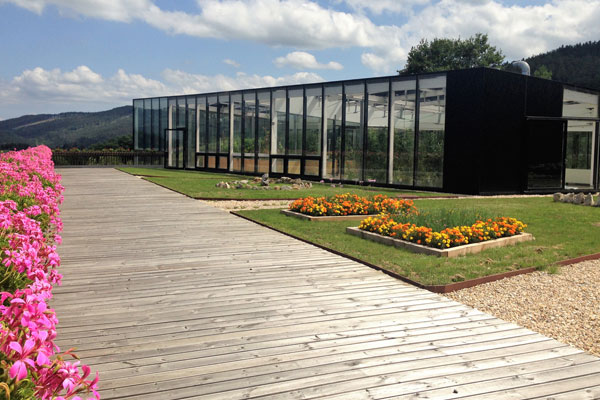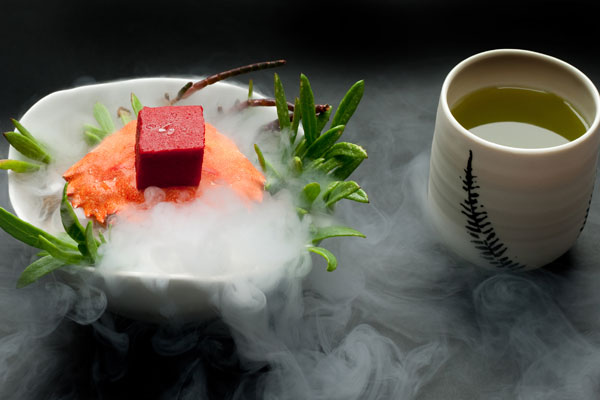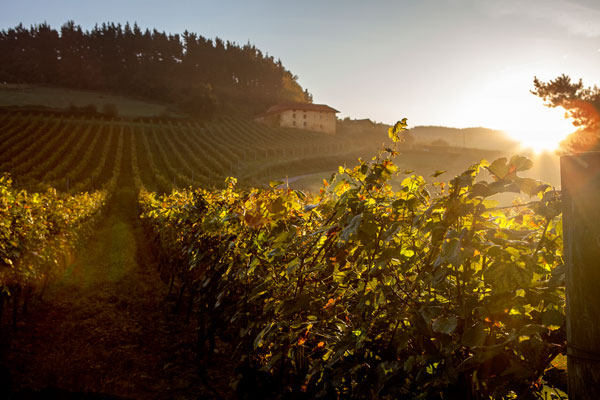Header: Eneko Atxa celebrates Azurmendi's Sustainable Restaurant Award with Santiago Alfonso, Marketing and Communications Vice President of Cosentino Group; beans and assorted meats
For the second time in four years, Azurmendi in Larrabetzu, Spain, was recognised with the Sustainable Restaurant Award, sponsored by Dekton by Cosentino, given to the restaurant in The World’s 50 Best Restaurants extended list that achieves the highest sustainability rating.
We spoke to chef, innovator and campaigner Eneko Atxa about the next gastronomic revolution, why sustainability is as much about people as it is about the environment and how nature writes Azurmendi’s menu.
How do you feel having recently picked up the Sustainable Restaurant Award for Azurmendi?
The best award was having the opportunity to receive all our friends, chefs from all over the world, foodies and journalists here in Bilbao, in our house. But if any prize gives me a special excitement, it’s the Sustainable Restaurant Award. We had already received it [in 2014], but we didn’t stop growing and evolving with different visions and we are doing new things every day.
I always say that I’m a chef and I understand perfectly that my day-to-day job is to make my clients happy, but I also like the fact that there is another cuisine, a cuisine that is cooking a better future. We are pushing sustainability, healthy eating and social responsibility.

Azurmendi's striking exterior in the Basque hills
Why is it important to focus on sustainability today?
We must seize the unique opportunity that we are being given as chefs, with all the spotlights on us – with society supporting us and respecting us – we must give back. We have to use the knowledge that chefs and gastronomes have as a tool to help promote a better future.
Nowadays, there are two conceptions about sustainability that are wrong. The one that bothers me most is when people think that this is a trend and not a responsibility or a commitment. I understand that it is a great responsibility to think about the future, about what we are going to leave behind and what we are doing to our own environment. But it’s a problem and if we don’t start working on it and solving it today, there will be no solution tomorrow. We have barely enough time.
The second issue is that people think that sustainability is about being green and eco-friendly and taking care of plants, but it’s a lot more complex. Of course it has to do with the environment, but it also has to do with people, because we are the ones who live in the environment. That’s why, over the past 18 months, we launched different projects that have a lot to do with people.
What are some of these projects?
Azurmendi is an atypical project in that the majority of restaurants like ours are open in the evenings because at dinner is when you make the most bills. So they’re either closed for lunch or they do double shifts. We are different. Since 2005 we have been campaigning to open only at lunch [in order] to reconcile work with family or social life. We changed that expectation of the client by explaining them that there are other options. So we start working in the morning, we finish in the afternoon and we go home.
How did we do it? Well, in the end we have more people in the team, we found more resources, but we understand that it is something more sustainable over time, more lasting, more important.

Spider crab at Azurmendi
What other sustainable initiatives are you working on?
There is a project that we have been working on for a long time, which is the seed bank. We have recovered 400 varieties of local seeds in a region as small as the Basque Country. There is something much more important behind this story, because when we promote a product we also encourage the people behind the product.
But my most beautiful project this year is this. We went to the local hospital and we asked them to let us prepare the meals for the patients once a month this year, twice a month the following year, three times the third year, and so on, up to five. I'm going to the culinary schools in our area and recruiting students, telling them: “Look, you're learning how to be an excellent chef, but being an excellent chef requires knowledge. What you don’t yet know is that with knowledge you can do something magical, which is to help others, to bring interesting things to society.”
Then I will give them the opportunity to come to Azurmendi and work with us on the hospital project. So they understand that knowledge is a power they have, and with that power they can transform things. They can cook something more than dishes, they can cook conscience, a better spirit.
How does the diner experience sustainability at Azurmendi?
The first thing that you see when you arrive at the restaurant is a sign that says that we have a sustainability centre you can visit. The doors are always open. Then in the parking lot are stations to charge electric cars. As you come towards the restaurant, there are some striking trees that people often ask about. It’s a perfect pretext for us to explain that the trees hide conduits that go 150m underground, where we extract geothermal energy. We also have solar panels.
People often comment on how much it rains in the Basque Country. We believe this is an opportunity, because our wonderful landscape is given to us by the rain. We take the opportunity to tell them that we recycle rainwater. Sustainability can seem intangible, but when you arrive and observe it with your eyes, you realize that you can touch it, it’s a reality.

Azurmendi and Gorka Izagirre's vineyards
How do you develop your menus?
When it comes to the menu, it’s not me who decides. The farmers and producers are the interpreters, the midwives of nature, who take care of what nature gives and then deliver it to us. Many years ago, I was in Japan with Chef [Yoshihiro] Murata, one of the great masters of kaiseki cuisine. I had a crazy desire to know what his source of inspiration was. He said he would pick me up early in the morning to show me how he creates. I thought we were going to his kitchen, but we went out in the fields and talked to his gardeners. They were explaining that in the coming season the cabbages would be very good, so he should put cabbages on his menu, but he shouldn’t put a certain type of radish, because the weather wouldn't be good for them. Then I understood that it’s nature who decides what we have to put on the table.
Why should chefs and people of all kinds get involved with sustainability initiatives?
All these initiatives can seem very small, but they are small changes that help to change the world. We are going to change the perception of the cook, who nowadays seems like a rock star, but in 10 or 15 years, chefs can be seen as people who are dynamic tools of society.
There have been great revolutions in the kitchen. The great revolution of nouvelle cuisine, Basque cuisine, the Ferran Adrià revolution, Nordic cuisine, and now everyone is asking what will be the next revolution. I believe in the humanistic revolution. People who are part of the world of gastronomy – journalists, chefs, waiters – we must all influence society because society is listening to us at this moment. We have an opportunity and if we don’t use it right, we will lose it in five or 10 years.
It is worth making an effort, keeping in mind that each one of us has to cook extraordinarily well, has to give outstanding hospitality, has to create great experiences and has to make the business profitable, which is also an important part of sustainability. But outside of the kitchen, it’s important that we use our energy especially for doing good. I don’t say it as something populist or as marketing. I say it with an open heart because I think that we have a responsibility and we have to be generous, because the environment and society have been so generous to us.
The Sustainable Restaurant Award is given to the restaurant with the highest environmental and social responsibility rating, as ranked by audit partner the Sustainable Restaurant Association (SRA). In 2017 and 2018, applications were open to all restaurants in the 50 Best and 51-100 list and restaurants must self-nominate to be eligible. Azurmendi follows in the footsteps of Septime, the 2017 winner, and Relae, which won in 2016 and 2015.
Now watch the highlights from The World's 50 Best Restaurants 2018:
Eneko Atxa, Gaggan Anand and Joan Roca spoke at #50BestTalks: Life Cycle about their involvement in Farm Africa's new initiative Chefs for Change. Stay tuned for the video of their talk, coming soon on YouTube, and follow us on Facebook, Instagram and Twitter for the latest news from The World's 50 Best Restaurants.

